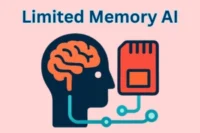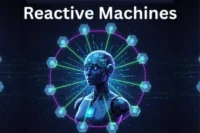Benefits of AI in Cyber Security – Simple Guide for Beginners
Published: 23 Sep 2025
Do you know that smart computers can help people protect people on the internet? This is called artificial intelligence (AI) in cybersecurity. The benefits of AI in cyber security are big because it works like a smart guard for computers and phones. It can see websites and apps without getting tired. If any information is hacked or stolen, AI can find it quickly and warn people.
It also learns from previous attacks, so it can stop new people next time. In this article, you will learn about the main benefits of AI in cybersecurity and why it is so important to keep our online world safe.
What Is AI in Cyber Security?
AI in cybersecurity means using smart computer programs to protect computers, phones, and websites. These programs can see what happens in a network all the time. If something seems strange, they can warn people or stop it immediately.
Simple example: Imagine a robotic watch for a website. If someone tries to break or steal the data, the robot quickly notices abnormal activity and blocks the bad person before any harm.
Main Benefits of AI in Cyber Security
AI can help protect computers and networks in many ways. It works quickly, learns new problems, and helps put people at risk before they cause disadvantages. These benefits of AI in cyber security make it easy to protect information and stay safe online.
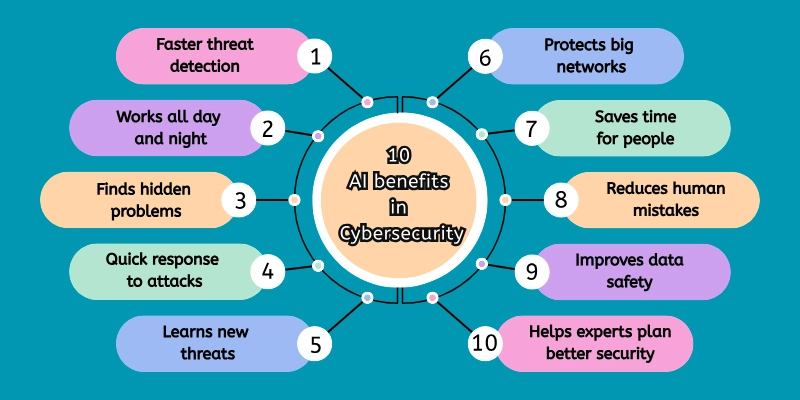
- Faster threat detection
- Works all day and night
- Finds hidden problems
- Quick response to attacks
- Learns new threats
- Protects big networks
- Saves time for people
- Reduces human mistakes
- Improves data safety
- Helps experts plan better security
Without further delay, let’s discuss the benefits of AI in cyber security one by one in detail.
1. Faster Threat Detection
AI helps very quickly to not notice web problems. It can see the dangers that humans cannot see in time. It helps to protect important files and systems immediately.
- Unusual file detects activity.
- The virus finds quickly.
- Notice the strange login.
- Scans downloads for malware.
- The unusual network monitors traffic.
- Sends notice quickly to the teams.
- Checking many systems quickly.
- Prevents the attacks from spreading.
2. Works All Day and Night
AI never sleeps, so it can protect systems continuously. It keeps networks safe even when people are not working.
- Monitors networks 24/7
- Watches emails and chats constantly.
- Checks websites while people sleep.
- Alerts experts instantly.
- Guards servers continuously.
- Detects threats at any time.
- Covers multiple systems simultaneously.
- Reduces risks during off-hours.
3. Finds Hidden Problems
AI can uncover threats that are difficult to see. It looks deep into files and programs to spot risks before they become serious.
- Detects hidden malware.
- Finds unusual behavior in programs.
- Monitors system logs for clues.
- Spots suspicious downloads.
- Notices weak passwords.
- Checks for unsafe website activity.
- Finds irregular network patterns.
- Alerts experts about subtle risks.
4. Quick Response to Attacks
AI can react immediately when it detects a problem. It helps stop hackers before they can do serious damage.
- Blocks malicious files fast.
- Sends alerts to teams quickly.
- Shuts down harmful processes.
- Reduces system damage.
- Helps restore files safely.
- Stops hackers from spreading.
- Keeps sensitive data safe.
- Acts faster than humans can.
5. Learns New Threats
AI gets smarter by learning from past attacks. It can predict new risks and improve security over time.
- Remembers previous attacks
- Identifies new hacker techniques.
- Adapts to evolving threats.
- Improves detection methods automatically.
- Predicts potential cyber risks.
- Learns patterns in data.
- Helps teams prevent repeated problems.
- Updates itself without human help.
6. Protects Big Networks
AI can watch large systems that humans cannot check completely. It keeps networks with many computers safe and organized.
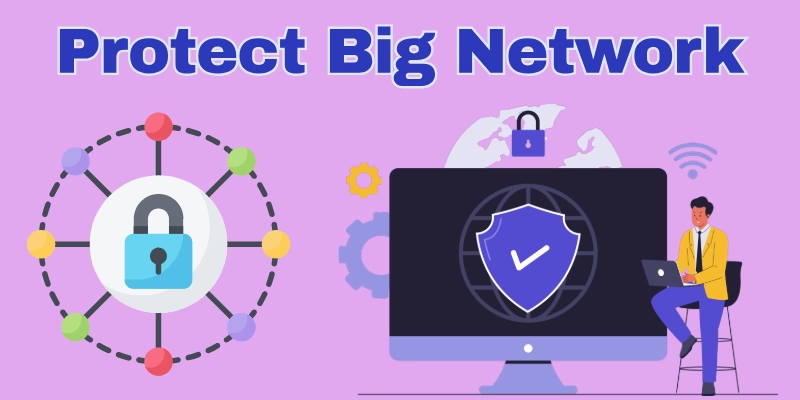
- Monitors multiple servers at once.
- Checks networks in offices and schools.
- Tracks activity in different locations.
- Watches many users at the same time.
- Keeps cloud systems secure.
- Finds problems in large networks.
- Supports IT teams in safety checks.
- Covers systems humans cannot monitor fully.
7. Saves Time for People
AI does time-consuming tasks automatically. This allows experts to focus on important security work instead of repetitive checking.
- Scans files automatically.
- Checks emails for threats.
- Sends alerts when needed.
- Reduces repetitive manual work.
- Helps teams focus on urgent issues.
- Speeds up investigations.
- Saves hours of checking.
- Frees people to plan security improvements.
8. Reduces Human Mistakes
AI follows rules exactly and never forgets. It prevents mistakes that humans often make, keeping systems safer.
- Avoids missing unusual activity.
- Stops accidental breaches.
- Maintains accurate records.
- Follows instructions perfectly.
- Reduces errors in big systems.
- Works consistently without fatigue.
- Helps experts trust results.
- Minimizes human oversight problems.
9. Improves Data Safety
AI protects personal and business information from hackers. It helps keep online systems safe and trustworthy.
- Guards passwords and accounts.
- Protects important documents.
- Prevents unauthorized access.
- Monitors file usage continuously.
- Stops data leaks.
- Alerts about unsafe behavior.
- Secures emails and messages.
- Keeps online systems reliable.
10. Helps Experts Plan Better Security
AI provides detailed reports and information to guide humans. Experts can use these insights to make stronger security plans.
- Shows where attacks happened.
- Highlights weak points in systems.
- Suggests safety improvements.
- Guides teams in creating rules.
- Provides useful trends in threats.
- Helps prevent future problems.
- Supports strategic security decisions.
- Gives data for smarter planning.
Examples of AI in real-life in cybersecurity
AI already helps save your computer and network in many ways. Here are some simple examples of AI in cybersecurity that you can see in daily life:
- Email Spam Filters: AI checks email and prevents unwanted or dangerous messages from reaching inboxes.
- Bank fraud notes: AI detects unusual transactions and raises alerts if a person attempts to steal money.
- Security check of websites: AI scans websites to find viruses, unsafe links, or suspicious activity.
- Password Security: Some AI tools warn you if your password is weak or has been used by hackers.
- App Security: AI checks the apps or tablets for malicious software before downloading them.
- Online Shopping Security: AI looks for fake or dangerous websites when shopping online.
- Social Media Alert: AI can detect fake accounts or suspicious messages to keep users safe.
These examples show how AI helps protect people and companies every day, even without us.
Tips for Using AI in Cyber Security
AI can help a lot, but people still need to use it carefully. Here are some easy tips to get the most benefit from AI:
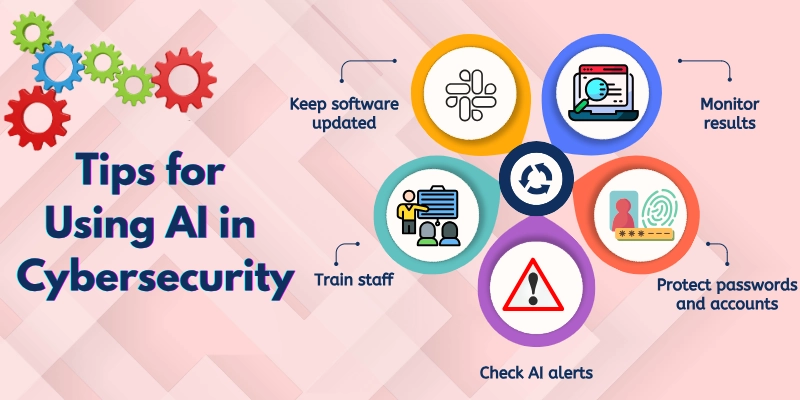
- Keep software updated: Always install the newest updates to make AI work better and stay safe.
- Train staff: Teach workers how to utilize AI tools effectively, ensuring they understand their purpose and how to use them.
- Check AI alerts: Don’t trust AI alone; look at alerts and make sure they are correct.
- Use AI as a helper: Let AI assist, but humans should make final decisions.
- Protect passwords and accounts: Even with AI, keep login info safe.
- Monitor results: Watch what AI does to make sure it is working properly.
- Plan for mistakes: Be ready in case AI misses a threat or gives wrong info.
These tips help people and companies use AI safely and make cybersecurity stronger.
Possible Challenges
Even though AI is very helpful, it is not perfect. There are some challenges that AI professionals need to be aware of when using it for cybersecurity.
- High setup cost: Buying AI tools and machines can be expensive.
- Training needed: AI needs the right data to work properly, and teaching it takes time.
- Can make mistakes: If AI learns incorrect information, it might give incorrect data.
- Needs experts: Sometimes, people with special skills are needed to manage AI.
- Updates are important: AI must be updated often to handle new threats.
- Dependence on technology: Relying too much on AI can make humans less careful.
- Hardware problems: Machines can break or stop working unexpectedly.
- Internet connection needed: Many AI tools need constant online access to work.
These challenges show that while AI is helpful, people still need to use it carefully and check its work.
Conclusion
So, guys, in this article, we’ve covered the benefits of AI in cyber security in detail. AI can detect threats fast, protect big networks, and save time for people who keep our data safe. In my view, it is a smart helper that makes the internet more secure, but it still needs careful checking by humans. Always keep your software updated and double-check AI alerts to avoid mistakes.
If you are interested in this topic, start learning more about AI tools and how they protect information. The more you understand, the better you can use AI safely and make the online world a safer place for everyone.
FAQs: Benefits of AI in Cyber Security
Here are some FAQs about the Benefits of AI in Cyber Security.
AI helps keep computers and networks safe. It looks for strange actions that might mean someone is trying to hack or steal information. AI can check many files and messages very quickly, much faster than people. When it finds something risky, it alerts the security team so they can stop the problem before it spreads.
AI can read and understand huge amounts of data in just seconds. People need much more time to look through the same information. AI also works without getting tired or losing focus. This means it can catch dangers as soon as they appear, even when people might miss small signs.
Yes, AI systems work 24 hours every day, even at night. They keep watch when people are asleep or away from work. This nonstop protection means hackers have a much smaller chance of breaking in. Companies can feel safe knowing AI is always on guard.
AI studies patterns of normal activity on computers and networks. If it sees something unusual, like a sudden change in data or a strange login, it gives a warning. It can even spot problems that humans would not notice because they are too small or too well hidden. This early warning helps experts fix issues before they grow.
No, AI is smart but not perfect. Sometimes it can give a false alarm or miss a real danger if the data it learned from is wrong. That is why humans should always check the AI’s alerts. Working together, people and AI can catch more threats and reduce mistakes.
Setting up AI tools can cost a lot at first. Companies need to buy strong computers and pay experts to install and train the system. But in the long run, AI can save money because it stops big attacks that could cause even more loss. Many businesses see it as a smart investment for future safety.
Always keep the AI software updated so it knows about new types of attacks. Use strong passwords and change them often. Double-check any warnings AI gives before making changes. Teach workers how to use AI properly so everyone understands how to keep data safe.
No, AI is made to help humans, not replace them. It can do many tasks faster, but humans are needed to make final choices and handle complex problems. Experts also teach AI how to spot new threats. The best results come when people and AI work together.
AI can protect both big and small companies. Large companies usually buy more powerful AI systems because they can afford them. Smaller companies can still use simple AI tools to stay safe. Even basic AI protection is much better than having no protection at all.
Email spam filters use AI to block junk or dangerous mail. Banks use AI to catch fraud when someone tries to steal money. Websites use AI to check for hackers and keep user data safe. These everyday examples show how AI protects people even when they don’t notice it.

- Be Respectful
- Stay Relevant
- Stay Positive
- True Feedback
- Encourage Discussion
- Avoid Spamming
- No Fake News
- Don't Copy-Paste
- No Personal Attacks

- Be Respectful
- Stay Relevant
- Stay Positive
- True Feedback
- Encourage Discussion
- Avoid Spamming
- No Fake News
- Don't Copy-Paste
- No Personal Attacks



